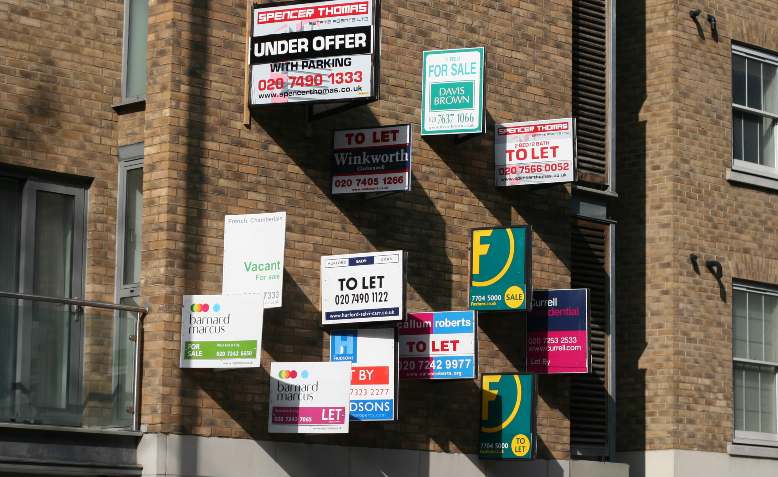 Estate agent signs. Photo: Paul Mison / Flickr / CC BY-SA 2.0, license linked at bottom of article
Estate agent signs. Photo: Paul Mison / Flickr / CC BY-SA 2.0, license linked at bottom of article
As house prices continue to spiral, the new Tory plan isn’t going to do anything to help young and working class people, argues Terina Hine
Back in October Boris Johnson announced to the Tory Party conference that he would to “turn Generation Rent into Generation Buy”, claiming his new housing policy would be the “biggest expansion of homeownership since the 1980s”.
The long awaited scheme, launched this week, takes the form of government guaranteed 95% mortgages. Young renters now only need to save a 5% deposit and they can jump onto that much coveted housing ladder.
Invoking Thatcher’s right-to-buy policy was a crowd pleaser for the Tory faithful, and a sign for the rest of us that the government intended to deal with the housing crisis with more fake egalitarian bluster. The right-to-buy policy, which claimed to help the poor become homeowners, decimated the public housing stock, eroded council incomes and advantaged only better off council tenants. It was also credited with helping the Conservatives win over many traditional Labour voters.
Just as with right-to-buy this new housing initiative is being promoted as opening up the dream of homeownership to a new class of people, in this instance the young. But this is Tory egalitarianism and will therefore fail all but a lucky few. It is a response to the housing crisis which will boost the housing market for those already on the ladder, those who can access the bank of mum & dad, and is a policy with a government bank bailout at its heart.
Banks are being encouraged to lend at high loan to value ratios (LTV). Homebuyers taking out a mortgage will not see any practical difference except for having to provide only a 5% deposit on their purchase. It is the lenders who are being most incentivised.
In February there were only three mortgage products on the market providing a 95% LTV; now several major banks have committed to launching new deals, and on Monday alone 38 new mortgage packages were launched.
Reluctance by lenders to indulge in high LTV schemes usually indicates a lack of trust in the stability of the housing market, but with government guarantees banks will happily indulge and lend – after all, why would they care about loan defaults when the government promises to bail them out? No wonder the banks are keen.
But will Generation Rent actually be able to take participate?
Of course some will, but first they must produce the 5% deposit – which may not sound much as far as the LTV ratio goes, but in terms of £s and pence is way beyond the purchasing power of most. Those already paying far too much in rent are unable to set aside and save anything like the 5% required, especially in areas where rents and property prices are highest.
According to Rightmove, based on average house prices, the UK average 5% deposit would be £16,000. In the cheapest region (the North East) it would be nearly £8,000; in the South East over £20,000 and in London the figure is over £31,000. Saving these amounts, in their respective regions, would be a very tall order.
But it’s not just the deposit. Mortgage lenders base how much they will offer buyers on their earnings – applicants need to prove they earn enough to meet monthly mortgage repayments before any bank would consider giving a loan. Not helped by interest rates on 95% schemes being set higher than rates where deposits are bigger – repayments for a 95% loan cost about 0.7- 1% more than one for a 90% loan.
According to analysis conducted by The Guardian, mixed-sex couples in their 30s, both earning median incomes, could not afford to buy the cheapest type of property in 27 of London’s 33 boroughs or in much of the south east. A single woman on median income (£30,258) could not afford a 95% mortgage in more than half of local authorities in England and Wales. For a man on the median wage the situation is slightly better – he would only be able to afford a mortgage in almost half (48%) of authorities.
Single high-earners do not fare much better. A 32 year old woman in the top 20% of earnings for her age – the age most likely to be a first time buyer – still fails to qualify for the scheme in London, and a man in the same wage/age category would be excluded from the property ladder in all but one London borough.
Of course none of this takes into account that 78% of jobs lost due to the Covid crisis were held by those under 35. Not much chance of saving for or acquiring a mortgage there.
Incomes and house prices have diverged so dramatically over the last few decades that cutting deposits to 5% will have minimal impact on most people’s ability to own their home. In London many renters hand over more than half their income to their landlord. To turn Generation Rent into Generation Buy the first priority must be to reduce rents.
And if the government wished to address the housing crisis the country faces, then the most significant policy of all would be to build genuinely affordable social housing – and this time not to sell it off.
Fund the fightback
We urgently need stronger socialist organisation to push for the widest possible resistance and put the case for change. Please donate generously to this year’s Counterfire appeal and help us meet our £25,000 target as fast as possible.

